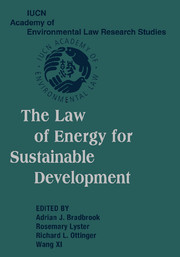Book contents
- Frontmatter
- Contents
- Acknowledgments
- Message from Kofi A. Annan, Secretary-General, United Nations
- Introduction – A Global Learned Society to Address Earth's Evolution: The IUCN Academy of Environmental Law
- Public Lectures on International Environmental Law
- PART ONE SUSTAINABLE DEVELOPMENT AND THE ROLE OF ENERGY LAW
- 1 Development and Energy
- 2 The Imperatives of Energy for Sustainable Development
- 3 2020 Energy Demand of China and Energy Conservation
- 4 Sustainable Development and the Marrakech Accords
- 5 Ethical Implications
- 6 Technological Implications
- PART TWO LEGAL ISSUES IN CONTEMPORARY ENERGY LAW
- PART THREE INTERNATIONAL ENERGY LAW
- PART FOUR COMPARATIVE ENERGY LAW
- PART FIVE ELECTRICITY RESTRUCTURING
- PART SIX FINANCING FOR SUSTAINABLE ENERGY
- PART SEVEN CIVIL SOCIETY AND THE PROCEDURAL REQUIREMENTS OF ENERGY LAW FOR SUSTAINABLE DEVELOPMENT
- Index
2 - The Imperatives of Energy for Sustainable Development
Published online by Cambridge University Press: 10 August 2009
- Frontmatter
- Contents
- Acknowledgments
- Message from Kofi A. Annan, Secretary-General, United Nations
- Introduction – A Global Learned Society to Address Earth's Evolution: The IUCN Academy of Environmental Law
- Public Lectures on International Environmental Law
- PART ONE SUSTAINABLE DEVELOPMENT AND THE ROLE OF ENERGY LAW
- 1 Development and Energy
- 2 The Imperatives of Energy for Sustainable Development
- 3 2020 Energy Demand of China and Energy Conservation
- 4 Sustainable Development and the Marrakech Accords
- 5 Ethical Implications
- 6 Technological Implications
- PART TWO LEGAL ISSUES IN CONTEMPORARY ENERGY LAW
- PART THREE INTERNATIONAL ENERGY LAW
- PART FOUR COMPARATIVE ENERGY LAW
- PART FIVE ELECTRICITY RESTRUCTURING
- PART SIX FINANCING FOR SUSTAINABLE ENERGY
- PART SEVEN CIVIL SOCIETY AND THE PROCEDURAL REQUIREMENTS OF ENERGY LAW FOR SUSTAINABLE DEVELOPMENT
- Index
Summary
Many challenges threaten the movement toward sustainable development. The most significant of these objectives include the simultaneous (i) social development and poverty alleviation, and (ii) economic growth, while (iii) protecting the environment. Past and present forms of economic growth have created a very uneven distribution of wealth between and within nations, and placed severe strains on the environment, resulting in urban air pollution, regional acidification, and global climate change, to name but a few.
Current trends in energy systems development, and several of the linkages between these systems and current unsustainable global socioeconomic development patterns shall be discussed here. The main finding is that strong links exist between sustainable development challenges and the energy systems in the world, and that major changes in energy systems are required to achieve sustainability at large.
CURRENT ENERGY SUPPLY AND DEMAND
During the last century, the use of fossil fuel resources – oil, natural gas, and coal – dominated world primary energy. In 2001, fossil energy use made up seventy-nine percent of world primary energy consumption. In comparison, renewables (including large hydro, traditional biomass, and new renewable like solar, wind, geothermal) made up fourteen percent and nuclear seven percent of world primary energy use. Furthermore, demand for energy services continues to increase with growing economies and population size. For example, between 1960 and 1997 in the OECD countries, primary energy use and electricity use increased by a factor of 2 and 4.5 respectively, to support a three-fold increase in the economies and an increase in population size of fifty percent.
- Type
- Chapter
- Information
- The Law of Energy for Sustainable Development , pp. 46 - 52Publisher: Cambridge University PressPrint publication year: 2005
- 1
- Cited by

